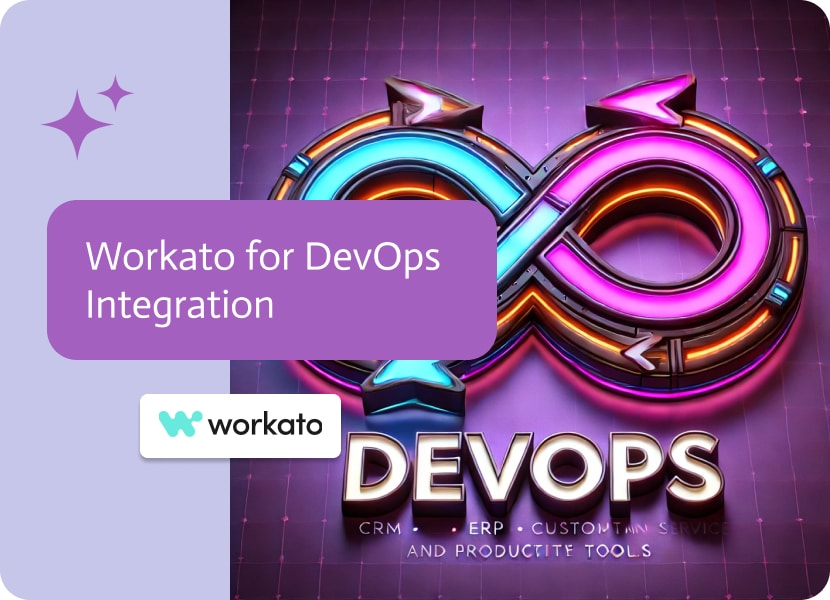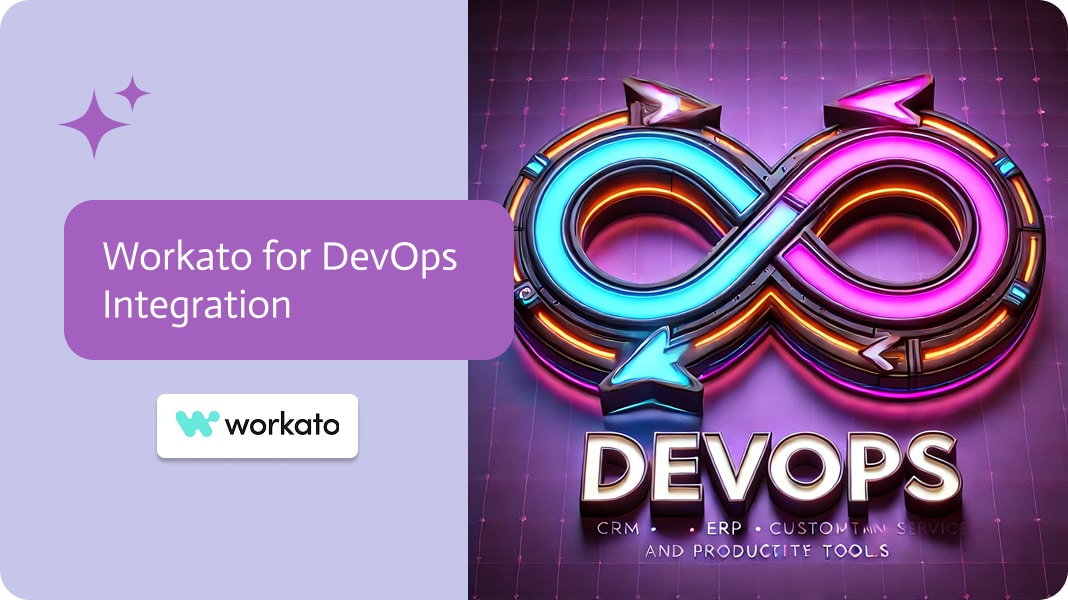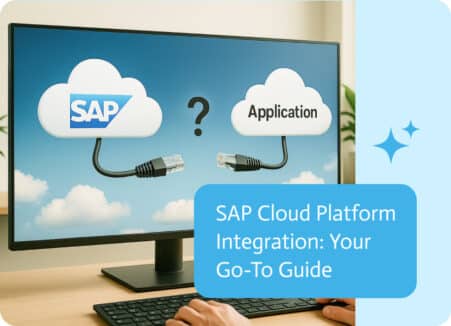

Workato DevOps Integration
What is Workato and How Can It Enhance DevOps Integration?
Workato is a powerful integration platform as a service (iPaaS) designed to streamline and automate workflows across diverse applications and systems. It connects both cloud-based and on-premises applications, facilitating seamless data exchange and process automation. Workato’s user-friendly interface allows users to create “recipes” that automate specific tasks by setting triggers and actions between integrated apps. With Workato’s DevOps integration capabilities, businesses can achieve higher efficiency, better data consistency, and enhanced collaboration. This makes Workato an invaluable tool for integrating DevOps tools and boosting overall operational performance.
The Essence of DevOps Integration
DevOps Integration focuses on connecting various business applications and data sources to create a cohesive operational environment. It centralizes data, improves inter-departmental communication, automates tasks, and boosts overall efficiency.
Leading 7 Use Cases
1. Azure DevOps and Jira Integration
Use Case: Integrating Azure DevOps with Jira enhances project tracking and collaboration. This integration ensures that all project updates, tasks, and timelines are synchronized across platforms, providing a unified view of project status.
Benefits:
- Unified communication
- Automated data syncing
- Improved workflow efficiency
- Enhanced team collaboration
With that being said, Workato DevOps integrations are still considered to be some of the most powerful.
2. Zendesk and Azure
Use Case: Syncing Zendesk with Azure DevOps streamlines task assignments and updates. This integration allows teams to manage support tickets more effectively, ensuring that updates are reflected across all connected platforms, reducing manual effort, and keeping everyone on the same page.
Benefits:
- Real-time task updates
- Centralized task management
- Reduced manual effort
- Enhanced team productivity
Workato DevOps Integrations handle all the jobs just as well.
3. Azure DevOps Calendar Integration
Use Case: Integrating calendar applications with Azure DevOps synchronizes schedules and reminders. This ensures that all appointments, meetings, and deadlines are visible across different platforms, aiding in better planning and time management.
Benefits:
- Unified scheduling
- Automated reminders
- Improved time management
- Enhanced team coordination
Workato DevOps integration allows automation of processes across a much broader range of business functions and applications.
4. Azure DevOps Slack Integration
Use Case: Connecting Slack with Azure DevOps automates communication workflows. This integration streamlines the process of sending, receiving, and managing messages, improving communication efficiency and reducing the likelihood of missing important updates.
Benefits:
- Automated communication workflows
- Centralized messaging
- Improved message management
- Enhanced team productivity
5. Dynatrace and Azure
Use Case: Syncing Dynatrace with Azure DevOps streamlines monitoring and incident management. This integration ensures that performance metrics and alerts are accurately captured and reflected in Azure DevOps, simplifying issue resolution and project tracking.
Benefits:
- Accurate performance tracking
- Automated incident management
- Improved project management
- Enhanced operational oversight
6. Kafka DevOps Integration
Use Case: Integrating Kafka with DevOps tools ensures seamless data streaming and processing. This integration allows teams to access, share, and update data in real-time, improving data management and collaborative efforts.
Benefits:
- Centralized data management
- Automated data processing
- Enhanced collaboration
- Improved data management
7. DevOps Ticketing System Integration
Use Case: Connecting a ticketing system with DevOps tools enhances issue tracking and resolution. This integration ensures that tickets are synchronized across platforms, making it easy to manage and resolve issues efficiently.
Benefits:
- Centralized ticket management
- Automated ticket updates
- Enhanced issue resolution
- Improved team collaboration
Workato: Streamlining DevOps Integration
Workato simplifies the integration of various DevOps tools. It provides an intuitive platform where users create “recipes” that define specific triggers and actions across applications. Whether syncing Jira with Azure DevOps for automated task updates or connecting Slack with Azure DevOps for seamless project communication, Workato enhances operational efficiency and data accuracy.
Key Benefits of Using Workato
Automating repetitive tasks with Workato reduces manual effort and minimizes errors, allowing teams to focus on strategic initiatives that drive business growth. With comprehensive access to business data, decision-making becomes more informed, issues are resolved quicker, and there’s a deeper understanding of business needs. Real-time data synchronization ensures information is consistent and up-to-date across all systems, facilitating accurate reporting and effective decision-making. Integrating various tools and platforms consolidates operations, reduces silos, and promotes collaboration across departments, leading to higher productivity and efficiency. Additionally, unified data from multiple sources allows for advanced analytics and reporting, providing valuable insights into business performance and trends to inform strategic growth.
Challenges of Workato for DevOps Integration
While Workato is a robust tool for integrating DevOps applications, it presents several challenges that users should consider. Here are some common issues associated with using Workato for DevOps integration:
- Complexity of Toolchain Integration: DevOps environments often involve a complex toolchain with numerous applications for different stages of the development lifecycle. Integrating these diverse tools with Workato can be challenging, requiring detailed configurations and fine-tuning to ensure smooth operation across the entire toolchain.
- Real-Time Data Processing: DevOps relies heavily on real-time data processing for continuous integration and continuous deployment (CI/CD) pipelines. Users have reported that Workato does not always handle real-time data updates effectively, which can lead to delays and disruptions in the CI/CD process.
- Customization Limitations for DevOps Workflows: While Workato offers a variety of pre-built connectors and recipes, there may be limitations in customizing workflows specific to DevOps needs. This can be restrictive for organizations with unique or highly specialized DevOps processes, necessitating additional manual work or custom development.
- Security and Compliance Concerns: DevOps environments often deal with sensitive code and data. Ensuring that Workato meets all necessary security standards and compliance requirements can be challenging. Users need to carefully manage permissions and access controls to protect their DevOps pipelines.
- Learning Curve: Despite being marketed as a no-code platform, Workato still requires a significant investment in training and learning. DevOps teams may find it difficult to fully utilize all features without extensive training, which can delay implementation and reduce the platform’s effectiveness.
- High Costs: Workato’s pricing structure can be a significant obstacle, particularly for smaller businesses or startups. The costs escalate rapidly with the addition of more integrations, users, and features. This high price point can make Workato less accessible for organizations with limited budgets, forcing them to seek alternative solutions or reduce the scope of their integrations.
- Lack of AI Capabilities: One of the significant drawbacks of Workato is the lack of advanced AI capabilities. Intelligent automation and AI-driven features are increasingly important for enhancing the efficiency and effectiveness of DevOps integration. The absence of robust AI functionality in Workato means that many complex tasks still require manual intervention, reducing overall productivity.
Understanding these potential challenges can help businesses make informed decisions about using Workato for their DevOps integration needs and whether exploring alternative solutions might be more beneficial.
Exploring Workato Competitors for DevOps Integration
While Workato excels in DevOps integration, some Workato competitors offer unique strengths. For instance, Noca AI leverages advanced AI and natural language processing to create intelligent and efficient integrations, enhancing user experience and operational flow. MuleSoft stands out with its vast array of app integrations, catering to complex enterprise needs. Boomi, on the other hand, is praised for its sophisticated data manipulation and seamless connectivity. These alternatives provide a range of specialized features, enabling businesses to find the perfect fit for their unique integration requirements.


